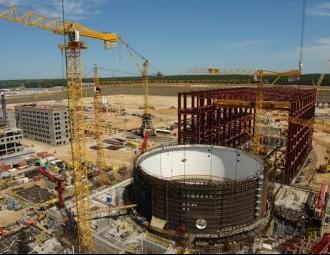Lithuanians don’t want to live close to Astravets nuclear power plant
03.11.2013 | In the World

Lithuania says that the ongoing construction of the Belarusian NPP before the Espoo Convention is completed is an obvious instance of failure to comply with provisions of the Convention.
The Lithuanian foreign ministry has called on Belarus not to start building a nuclear power plant until the expected environmental impact of the project has been assessed.
Given that on October 29, the Belarusian emergency management ministry issued a license for the installation of nuclear equipment in the first unit of the would-be nuclear power plant in Astravets, Hrodna region, the Lithuanian foreign ministry notes that the "environmental impact assessment process of the Belarusian NPP [nuclear power plant] under the Espoo Convention has not been completed," BelaPAN quotes the ministry saying so a press release. "Therefore, the ongoing construction of the NPP and the decision to start installing nuclear equipment are obvious instances of failure to comply with provisions of the Convention."
The ministry notes that the Espoo Convention’s Implementation Committee issued a report in April 2014 saying that Belarus was not in compliance with its requirements. "The Committee requested Belarus to provide detailed answers to all the questions raised by Lithuania and to take into account comments of the Lithuanian experts, to ensure that the Lithuanian public was provided with opportunities to make comments on the construction of this nuclear power plant, and to comply with other requirements of the Espoo Convention," the press release says.
On October 21, the Belarusian environmental protection ministry launched a project aimed at "public monitoring" of the environmental impact of the nuclear power plant.
The ministry's press office said that experts would measure the concentration of radionuclides in the water, soil and air within the framework of the project, and that the findings would be published in December. The impact of the nuclear power plant will be monitored both during and after the construction stage, and reports will be published every year, the press office said.
Belarus` nuclear power plant will be situated some 10 miles from the Lithuanian border. Its two reactors are to have a generating capacity of up to 2,400 megawatts in total. The first unit of the plant is scheduled to be put into operation in 2017 and the other one in 2018. AtomStroyExport, a subsidiary company of Russia`s Nuclear Energy State Corporation (Rosatom), is to bear full responsibility for the project as the prime contractor.
-
03.01
-
07.10
-
22.09
-
17.08
-
12.08
-
30.09










































